





MOSIP has provided comprehensive investment management services, education, and support to Missouri school districts, counties and other political entities since 1991.

Learn more at
mosip.org
This information is for institutional investor use only, not for further distribution to retail investors, and does not represent an offer to sell or a solicitation of an offer to buy or sell any fund or other security. Investors should consider the investment objectives, risks, charges and expenses before investing in any of the Missouri Securities Investment Program’s portfolios. This and other information about the Program’s portfolios is available in the Program’s current Information Statement, which should be read carefully before investing. A copy of the Information Statement may be obtained by calling 1-877-MY-MOSIP or is available on the Program’s website at www.mosip.org. While the MOSIP Liquid Series seeks to maintain a stable net asset value of $1.00 per share and the MOSIP Term portfolio seeks to achieve a net asset value of $1.00 per share at the stated maturity, it is possible to lose money investing in the Program. An investment in the Program is not insured or guaranteed by the Federal Deposit Insurance Corporation or any other government agency. Shares of the Program’s portfolios are distributed by PFM Fund Distributors, Inc., member Financial Industry Regulatory Authority (FINRA) (www.finra.org) and Securities Investor Protection Corporation (SIPC) (www.sipc.org). PFM Fund Distributors, Inc. is an affiliate of PFM Asset Management LLC.
BOARD OF DIRECTORS
President: Michele DeShay, Mayor, Moline Acres; Vice President: Matt Turner, Alderman, Harrisonville; Immediate Past President: *Joe Garritano, Council Member, Wildwood; Damien Boley, Mayor, Smithville; *Chuck Caverly, Council Member, Maryland Heights; Bryant Delong, Mayor, North Kansas City; Reed Dupy, Council Member, Chillicothe; Jerry Grimmer, Council Member, Bridgeton; Cemal Umut Gungor, City Administrator, Grandview; Dwaine Hahs, Mayor, Jackson; *Debra Hickey, Mayor, Battlefield; *Chris Lievsay, Council Member, Blue Springs; Ken McClure, Mayor, Springfield; Chris McPhail, Alderman, Clever; Sheryl Morgan, City Clerk, Blue Springs; Lori Obermoeller, Finance Director, Creve Coeur; Tom Oldham, Council Member, Sedalia; Len Pagano, Mayor, St. Peters; *Matt Robinson, Mayor, Hazelwood; Mike Roemerman, Mayor, Ellisville; *Kathy Rose, Mayor, Riverside; *Carson Ross, Mayor, Blue Springs; Erin Seele, Attorney, Cunningham, Vogel and Rost; Gerri Spencer, Alderman, Kearney; Jeana Woods, City Administrator, Osage Beach
*Past President
AFFILIATE GROUPS

Missouri City Management Association; City Clerks and Finance Officers Association; Government Finance Officers Association of Missouri; Missouri Municipal Attorneys Association

EDITORIAL
Laura Holloway / Editor Lholloway@mocities.com
Richard Sheets and Lori Noe Contributing Editors
GRAPHIC DESIGN
Rhonda Miller
The Review September/October 2023; Volume 88, No. 5
The Missouri Municipal Review (ISSN 00266647) is the official publication of the Missouri Municipal League state association of cities, towns and villages, and other municipal corporations of Missouri.

Publication office is maintained at 1727 Southridge Drive, Jefferson City, MO 65109.
Subscriptions: $30 per year. Single copies: $5 prepaid. Advertising rates on request. Published bi-monthly. Periodicals postage paid at Jefferson City, Missouri.
Postmaster: Send form 3579 to 1727 Southridge Drive, Jefferson City, MO 65109.
To contact the League Office call 573-635-9134, fax 573-635-9009 or email the League at info@mocities.com. Website: www.mocities.com.
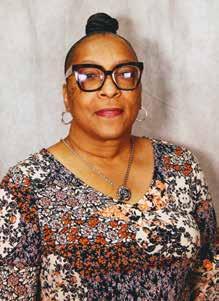
It has been an honor to serve this year as your MML President. I am so appreciative of the relationships and knowledge this opportunity has provided me. This role has allowed me to meet MML members and hear the stories of how you are taking care of your communities. It has afforded me time at national events to understand challenges across the U.S. and see that many states face the same challenges we have.
I have also been able to spend more time observing the hard work of the MML advocacy team and our executive director. Finally, I have developed a new level of love and respect for MML staff. They are knowledgeable, honest, helpful and friendly – and are always only a phone call away!
The League is the best thing that ever happened to our municipalities. Make sure you are benefitting from the One Stop library online, the expert speakers at events, or the networking at a regional meeting. I can’t encourage you enough toutilize the many resources available.
One great way to be more active with the League is through MML policy committees. You can choose one tailored to what most interests you, and the committees meet one day each June to review the current policy and suggest changes or additions for the following year. It is a great way to meet fellow members and gain more knowledge about how the challenges you face can be addressed at the state level.
The four policy committees are:
• Economic Development and Human Resources
• Finance and Taxation
• Municipal Administration and Intergovernmental Relations
• Environment, Energy and Sustainable Development
It has been a joyous experience and journey for me. I strongly encourage each of you to be at the table in making your voice heard by getting involved in the decision-making process. Perhaps you have heard the saying – If you are not at the table then you are on the menu! So do your part in making your community the best you can!
Finally, I encourage you to reach out to those who are not engaged with MML and bring them on board. Whether a city needs to join, or you meet a member official who is just not very active, let them in on the secret of what MML can do to keep them informed and serving well!
When you take the initiative to access MML resources, attend an event, ask questions, and share what you learn with others, it strengthens the voice of Missouri cities at the state and federal level. It is one of the best ways to serve your citizens.
This is your League. Make the most of it.
" Whether a city needs to join, or you meet a member official who is just not very active, let them in on the secret of what MML can do to keep them informed and serving well! "





For those of us in the world of local government, the relentless demands of our communities and the ever-increasing expectations for efficient service delivery can sometimes feel overwhelming. The post-pandemic world has further complicated matters, with the need to adapt to new workforce dynamics and technology-driven processes. It seems like we will never have enough time to complete all the tasks on our to-do lists. We are at an inflection point where we need to make changes to meet the needs of those we serve. One solution local government leaders should embrace is Artificial Intelligence (AI).
AI has already become a familiar fixture in most of our lives through applications like Siri and Alexa, but today’s AI tools offer far-reaching capabilities that can revolutionize local government operations. AI excels at data analysis, making it an invaluable asset for local governments seeking to make data-driven decisions. By processing vast amounts of information quickly and accurately, AI can identify patterns and trends that might otherwise go unnoticed. These insights can inform policymaking, resource allocation, and proactive planning, leading to more effective governance. Among the most popular AI technologies is ChatGPT, a

large language model that is free to use. However, ChatGPT is just one example, and various cities have been adopting AI to address an array of issues. For instance, Cobb County, Georgia, is utilizing AI to analyze and collect data on traffic crashes, while Sioux Falls, South Dakota, employs AI for predicting road icing risks.
As local government leaders, we find ourselves juggling numerous tasks daily, from resolving personnel issues to addressing citizen concerns and responding to emergencies. In such a dynamic environment, automating repetitive tasks or streamlining processes can be a game-changer. The “work smarter, not harder” approach involves leveraging AI to handle mundane tasks, such as writing resolutions, refreshing social media content or responding to routine emails. By offloading these time-consuming activities to AI, we
can save our valuable energy and focus on delivering high-quality humancentered services our communities expect and deserve. In many cases, it is much easier to be a content editor rather than a content creator. This is why we borrow content from our colleagues who have already implemented programs or policies. AI can take an already existing policy and modify it with your requests to include city-specific details in seconds.
A leader in our organization says, “We must embrace change, or we will become irrelevant.” Many of our communities are experiencing rapid growth and we must quickly adapt to the pace our community and organization needs and expects. As one of the fastest-growing communities in the state, change is required in our organization. We chose to embrace the change and others are recognizing our efforts. We have been acknowledged with awards like the St. Louis PostDispatch Top Workplace for the third time and, most recently, were recognized by the ETC Institute with a Leading the Way Award. This particular award was specifically created to recognize local governments for outstanding achievement in residential service delivery. Recipients of the award rank in the top 10% of all local governments
It is vital to maintain a broader perspective and recognize that AI is here to support rather than replace human capabilities. As local government entities, our existence revolves around serving people, and AI can complement our efforts, not replace them.
in the United States. Embracing change and adopting innovative technologies have been key factors contributing to our success. Encouraging an innovative culture, including implementing AI strategies in our day-to-day operations, has resulted in newfound time and opportunities to connect with the human aspect of our community and organization.
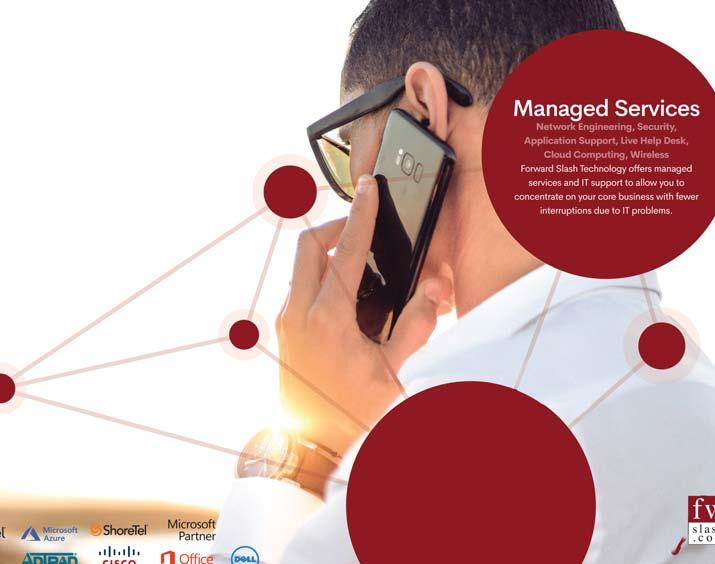
Amidst discussions about AI, concerns about job displacement have been raised. However, it is vital to maintain a broader perspective and recognize that AI is here to support rather than replace human capabilities. As local government entities, our existence revolves around serving people, and AI can complement our efforts, not replace them. While some jobs may undergo modification due to AI integration, we must acknowledge that workforce shortages are a pressing reality for many cities. In such cases, AI can bridge the gaps by automating tasks like lawn mowing, allowing staff to focus on more critical needs.
Some skeptics argue that reliance on AI might hinder critical thinking. I believe the opposite — AI tools can foster critical-thinking skills by serving as valuable resources to gather and analyze data. They can provide comprehensive information on various policy options,
enabling local government officials to make informed decisions. AI is not meant to replace our thinking; rather, it serves as an ally, empowering us to dive deeper into complex issues and arrive at creative solutions.
Since implementing AI strategies, numerous local governments have experienced positive outcomes. By embracing AI to handle mundane tasks, many have found themselves with newfound time to pursue projects that were once living indefinitely on the “someday” list. Imagine finally completing that long-awaited project that has eluded you due to time constraints. AI can facilitate this change by freeing up valuable resources and allowing you to focus on initiatives that truly matter.
AI’s potential extends beyond merely automating tasks; it can also improve service delivery by providing customized and efficient solutions. Chatbots powered by AI can engage with citizens, address their questions, and guide them to relevant resources. This 24/7 availability fosters a stronger connection between local governments and their communities, offering support and accessibility. This may not offer the same exact solution as a human interaction but is an additional tool local governments should strongly consider.
While the benefits of AI adoption are evident, it is crucial to emphasize responsible implementation. Privacy and data security must be addressed, as any AI system dealing with sensitive information requires robust safeguards. Additionally, transparency in AI decision-making is essential to build public trust and ensure fair and unbiased outcomes. Local government leaders and policymakers must continue to utilize ethical standards when using AI to implement policy changes and make decisions. Transparency will continue to be important as we utilize these tools and make recommendations.
Considering collaboration with the private sector could be helpful in accessing AI technologies. Many tech companies are actively developing AI solutions tailored for public sector use, providing local governments with customizable tools to address their specific needs. By fostering publicprivate partnerships, we can harness the full potential of AI for our communities’ benefit. Many of these companies may be vendors we are already utilizing. Consider asking what the future of their organization looks like for customers who want to embrace AI.
As we embark on an AI-driven future, it is essential to note that AI has plenty

DO . . .
• Be creative and experiment with your prompts.
• Keep asking different questions.
• Be clear in your queries.
DO NOT . . .
• Assume complete accuracy.
• Share confidential information.
• Be vague in your prompts.
of potential but also many challenges to overcome. It has shown bias in a variety of ways. It sometimes “hallucinates,” meaning it makes up something that sounds like it is real but is not. These programs were created by humans and can be a tool to help us succeed but must not be the only tool. We do need to remain critical of this technology and mindful when utilizing it. However, it is important as local government leaders, policymakers and employees that we should always be utilizing these skills, regardless of the use of artificial intelligence.
As local government leaders, our commitment to our communities drives us to explore innovative ways to serve better and more efficiently. By embracing AI as a powerful tool in our arsenal, we can revolutionize service delivery, maximize resources, and unlock opportunities for growth and progress. The potential of AI is boundless, and by adopting it responsibly, we can lead our communities into a future that thrives on innovation, accessibility and exceptional governance. Let us continue to work smarter, not harder, to fulfill our duty to the residents and communities we serve.
Jessica Hoffman is an award-winning government professional with a decade of municipal experience. As Wentzville’s assistant city administrator, she leads the economic development and community relations teams. Jessica, president and co-founder of Missouri Women Leading Government, earned the 2022 MCMA Richard R. Noll Outstanding Assistant Award and was named an ELGL 2022 Top 100 Local Government Influencer. She is currently serving as president elect for Missouri City/ County Management Association Board. She hopes to continue inspiring future municipal leaders.
Webinar: Introduction to AI In Municipal Government (National League of Cities)

https://www.nlc.org/resource/from-the-event-introduction-to-ai-in-municipal-government/
Webinar: Work Smarter, Not Harder (Missouri Women Leading Government)





https://www.gotostage.com/channel/e33d81db0aee46cdb1a3ce11eee3c2c6

Article: ChatGPT – The Future of Government Communication? (ICMA)

https://icma.org/articles/pm-magazine/insights-chatgpt-future-government-communication

Missouri Rural Services Workers’ Compensation Insurance Trust P.O. Box 104268, Jefferson City, MO 65110-4268 800-726-9304. www.missouriruralservices.com

Partnering with Schneider Electric allowed the City of St. Joseph, Missouri to modernize aging critical infrastructure, while respecting and preserving the town’s historical charm. All while saving money via innovative funding to get the job done.
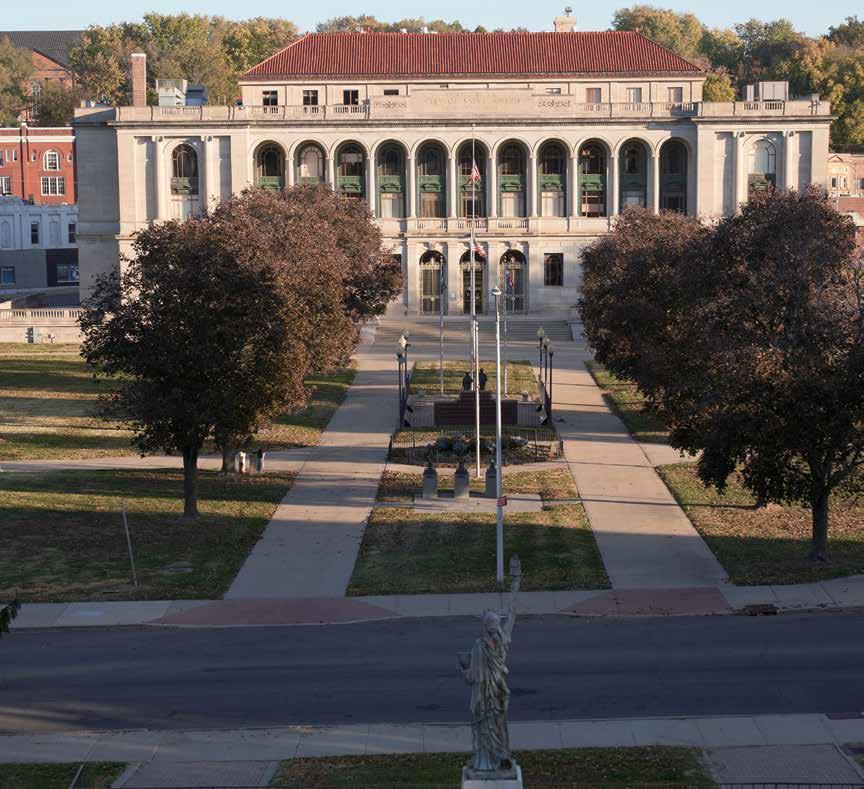
Scan to hear about what’s happening in the City of St. Joseph, MO

While innovating for the future, Missouri community preserves it’s past

What is the current status of broadband across Missouri, especially in terms of geographical coverage and acceptable speeds?
From the statewide perspective, there are approximately 337,000 unserved locations (locations lacking access to 25/3 megabits per second [mbps] service) and another 107,000 locations underserved (location lacking access to 100/20 mbps service). Those are big numbers. The good news is Missouri has been the recipient of many previously awarded federal programs. Missouri received a large number of Federal Communications Commission (FCC) awards through the Connect America Fund (CAF) and the Rural Digital Opportunity Fund (RDOF). Approximately 188,000 of the unserved and underserved locations I mentioned have been funded to be served through these programs. This leaves our office, the Missouri Office of Broadband Development, (OBD) with approximately 254,000 locations in need of service.
The “state” of broadband availability varies widely from region to region. The OBD recently completed a second tour of the state. At each stop we displayed a map of our understanding of availability in that region. It was striking how unique each region was. Some areas of the state are largely served, some had large areas lacking service and some had large federally awarded areas, that are currently without service but funded to be served. Each area brings with it unique challenges. With the grant programs our office is facilitating, we are prioritizing service that can exceed speeds of 100/20 mbps.
However, with the pandemic shining a light on the need to increase broadband access, our opportunities have greatly increased. Governor Parson and the legislature invested approximately $400 million dollars toward broadband programs. Our office received just under $300 million. With those funds we expanded the capacity of our office, offered competitive grants to expand cell service in areas lacking service and offered $265 million in competitive broadband grants. We were able to award more than $261 million in broadband grants, partnering with willing providers to bring more than 55,000 connections to areas of need.
While we have been working on completing these programs, we have been simultaneously planning for the coming opportunities. The largest investment in broadband is coming to the state in 2024 and the year to follow. Missouri will be allocated more than $1.7 billion in broadband infrastructure funding and more than $24 million in digital opportunity funding through the Infrastructure Investment and Jobs Act (IIJA). For the past year we have been touring the state, researching challenges and opportunities ahead, and generally preparing to implement these funds in the most efficient and impactful way possible.
The biggest challenge is the unique nature of each area of the state, with each area requiring a unique approach. Some areas have small areas in need of service, while others have large areas of need and few providers. Many areas are a combination of the two. With the coming funding we believe we will have the chance to address these challenges.
What is the role of the Missouri
Our office serves many roles. Daily, we are serving citizens of the state and helping to connect them with providers in their area in hopes of getting connected.
In recent years, the role of the office has dramatically changed. In 2018, the office facilitated the Missouri Broadband Grant program with $5 million in state funding.
In the spring of 2022 Missouri was awarded $42 million in a National Telecommunications and Information Administration (NTIA) Broadband Infrastructure Program award. This funded approximately 19 projects across Missouri. In January 2023 we announced the 60 projects funded through the American Rescue Plan Act (ARPA) broadband grant program. We are excited to see these projects making new connections every day.






















There is still a lot of work to do. In 2024, pending NTIA approval, our office will offer the first round of grants funded by the IIJA Broadband Equity Access and Deployment Program (BEAD). This is the $1.7 billion program I mentioned.

With these funds we will offer competitive grants to providers (of all types) to help bring service to unserved and underserved locations. This will be the largest investment Missouri has seen, and our goal will be to connect all Missourians. We intend to offer this funding through multiple rounds of competitive grants, shrinking the digital divide with each round and focusing the subsequent rounds on the remaining locations.
In addition to the hard infrastructure program, Missouri will utilize the $24 million in digital opportunity funding from the Digital Equity Act (DEA) to help address noninfrastructure barriers to broadband adoption. Beyond not having access to a connection, there are other reasons why people may not be currently engaging in the digital world. These include the affordability of the connection and the devices needed to connect, as well as the understanding and skill necessary to fully engage. Our office will look to address these barriers as well.
How much money has Missouri received and is there a breakdown of where the funds are going?
• $42 million in NTIA BIP Program.
• $295 million in ARPA Funding:

• $20 million to the Cell Tower Program;
• $15 million in pole replacement funds;
• $250 million in broadband infrastructure funds;


• $10 million in capacity funds (funding statewide mapping effort and our team’s capacity)
• IIJA funding: approximately $2 million in BEAD and DEA planning funds.
• Will receive $1.7 billion in BEAD (infrastructure) funding and $24 million in DEA funding.
The NTIA BIP and ARPA funds are currently being utilized. The IIJA funding will become available beginning in 2024.
What are the notable timelines for these programs and how should cities participate during their various stages?
Looking ahead to the Connecting All Missourians opportunities, we are wrapping up our planning efforts and the public will have the chance to weigh in on those efforts very soon.
In August 2023, our office published a five-year action plan as well as our state broadband map challenge plan. The public will have the chance to view our map challenge approach before we submit to NTIA.
In October of this year we will share our DEA plan and BEAD Initial Proposal. These plans will lay out how we intend to implement the BEAD and DEA funding. We will welcome the public’s input on these plans to ensure we are addressing the needs of all areas prior to submitting to NTIA. These proposals are due to NTIA in December and must be approved before we receive access to the ultimate funding.
OBD will conduct the state broadband availability map challenge, likely in late
2023 or early 2024. We will start with the locations and broadband availability from the FCC’s broadband availability map (broadbandmap.fcc.gov) and will ask that the public weigh in to make it as accurate as possible.
This will be the last chance for cities and all Missourians to weigh in on the reality of broadband availability prior to our IIJA funding. Our office will share an availability and eligibility map (currently under development). Through the map, municipalities, broadband providers, nonprofits and Missourians will be able to challenge locations they believe are inaccurately labeled as served or unserved. Following agreement regarding the reality of the service availability, our team will be charged with using the IIJA funding to bring connection to all the remaining unserved and underserved locations. Widespread participation is of the upmost importance.
We welcome cities to apply for funding or provide input on other’s applications. We want to support projects with local support.
We branded this our Connecting All Missourians campaign and that is absolutely our goal. There is a lot of money available and much work to do. We will be working each day to reach as many locations as possible with the funding.
Many times, our more rural areas are the most clearly unserved areas remaining. Unserved areas will be prioritized through the program. The program will allow us to be more flexible with match requirements or even the technology used in order to increase the likelihood we are able to reach these areas. Some areas of the state are lucky in that they have nontraditional providers working to bring service while others do not. In the toughest areas of the state our office will be working with local residents to help develop a plan to bring service.
There are some locations where a high-speed internet connection is especially important. The BEAD program encourages states to aim to get locations that meet the IIJA definition of a community anchor to an even higher standard of connectivity: 1 gigabit per second speeds for both upload and download. The institutions included by the IIJA are schools, libraries, medical providers, public safety entities (like police stations, fire houses, and emergency dispatch centers), institutions of higher education, public housing organizations, and community support organizations.











Missouri will need to decide how to define that last category and will welcome public comments on our proposed list. Many cities likely have properties that fall into one of these categories. Our office needs help identifying these locations and the ones that do not have one gigabit per second (Gbps) speeds. Cities should go to mobroadband.org/digital-assetmap to report their community anchor institutions and the speeds available.
Can cities become internet service providers and operate broadband networks like other municipal utilities?
Yes. The IIJA actually asks that states consider using nontraditional providers such as municipalities and cooperatives to help bridge the digital divide. As we did with the ARPA program, we intend to make municipalities eligible for the funding and welcome their submissions. Our team would be happy to visit with municipalities, and with any potential applicants, about the opportunity.
All applicants should be aware that the funding can only be used to bring service to unserved and underserved locations. Applicants should be mindful of that when considering their options.
What steps are being taken to mitigate collateral damage when installers expand service lines?
The OBD has been working with Missouri 811 and the providers to prepare for the amount of broadband work that will take place. Local governments should prepare for an increase in activity. We would be happy to help in any way we can.
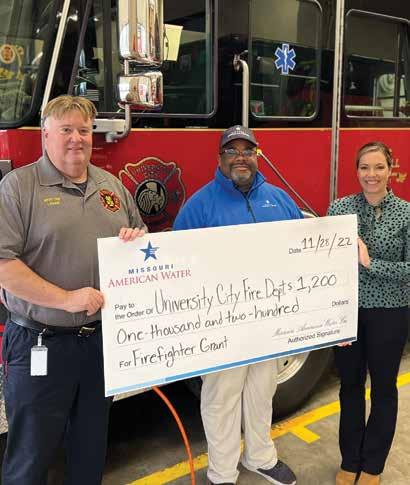
How should cities prepare for broadband expansion and how can they get involved?
Please stay engaged. Follow the latest from our office at http://www.ded.mo.gov/getconnected. In addition to the website, we host a webinar on the last Friday of each month and send regular updates through our newsletter. We welcome cities to engage in each of these. Additionally, anyone can reach out to our office and we would be happy to discuss their particular situation and how we may be able to assist. As I have mentioned, there is a lot of work to be done. We need the municipalities to be a part of this process.
BJ Tanksley joined the Department of Economic Development in January 2022, as the Director of the Office of Broadband Development. BJ’s career began with the Missouri Chamber of Commerce and Industry, where he worked for five years. Following that, he served as the Missouri Farm Bureau (MOFB) Southeast Regional Coordinator before returning to Central Missouri in 2016 to work as the State Legislative Director for MOFB. Proud
Periodically, it is a good activity for a municipality to review all policies and practices to determine if the municipality is in compliance with the Fair Labor Standards Act (FLSA) and the determinations that are available to the public employer. This article seeks to highlight those issues that are regularly under scrutiny by the U.S. Department of Labor and that have consequences when violated. This article is not to be considered a comprehensive review of the FLSA . Each employer needs to conduct its own review of its policies and procedures for legal compliance and for municipal financial accountability.
The first issue of importance is that an employer is required to have records related to each employee that assesses FLSA compliance. Each employee is to have a

Simple common-sense steps your own trusted staff can use to get you back in business before an “Authorized” service tech can get there.
Minimize down time. Get your pump stations, water plant, water treatment facility, emergency services, and lights back on without waiting in line for your service company to respond.
record for FLSA showing the employee’s identifiers, to set out the employee’s work period for hours worked related to compensation for overtime, the employee’s rate of pay (salary or hourly rates), when overtime is to be calculated and paid, and a record of overtime earned whether paid or maintained on the books as compensatory time.
It is also suggested that an employer identify what maximum level of compensatory time may be accumulated if below the level set by the regulations. When considering accumulation of compensatory time, an employer needs to know that compensatory time is liquidated at the time it is paid out at the hourly rate when paid, not the rate of pay when earned. This is important to understand because compensatory time increases in value each time an employee receives an increase in pay. It is also carried on the employer’s financial records as unliquidated liability that has a negative impact on some employer’s financial picture. Often, public employers do not see compensatory time as having any real value because it is not paid out with other pay. This misconception creates later financial impacts on budgets and audits and departmental expenditures when there are employee changes in status.
Save money by following NFPA inspection and testing procedures while using your own people.
You already have the equipment. You already have the staff. Provide them with this resource! www.generatorhelponline.com
It is critical that employers keep proper records including the recording of overtime. In the absence of proper records, an employee’s personal records may serve to identify unpaid overtime that is payable liability of the employer without regard to any employer’s policies for reporting. Penalties for failures to record and make proper payments may result in significant financial orders from the U.S. Department of Labor when an investigation is conducted.










Under the general regulations, most employees are paid for overtime worked in a work period of forty (40) hours in a seven-day period. Employers may select shorter work periods if desired that results in overtime liability being earned earlier than under the regulations. In determining the work hours an employer may consider unworked paid time as time worked to reach the 40hour work period. Some ways that this action is taken is to consider holidays, vacation days, sick days, and other approved unworked paid time off as time worked. An employer’s policies determine how to calculate when overtime is earned. When determining these possible additions to earning overtime pay, an employer needs to consider the full fiscal impact of granting such specific unworked paid time as reaching overtime allocations.
It should be noted that police and fire personnel can have a work period of more than a 40-hour work period. Police personnel may be scheduled up to 171 hours in a 28-day schedule or some reduced proportionate period. Fire personnel may be scheduled up to 212 hours in a 28-day schedule. Each employer needs to assess what works best operationally and financially for the service delivery desired for a community. Police departments with less than five sworn personnel are exempt from overtime regulations. When determining work periods, it is also important to review what number of hours are served for shift scheduling, such as for eight hours, 10 hours, or 12 hours used by a police department. The importance of these considerations often identifies conflicts with payroll issuance that overlaps work periods for determination of overtime liability. Twenty-eight-day schedules create 13 months of pay per calendar year when the calendar for 40-hour periods relates to 12 months.
Other critical considerations relate to exemptions from earning overtime. There are certain categories of management personnel whose positions may be exempted from overtime mandates provided the individual position meets the regulatory criteria for exemption. Currently the minimum salary level is set at $684 per week for regular non-exempt workers (29 USC 541), which are executive employees, administrative employees, educational employees, and computer employees; and $107,432 per year for “highly compensated employees”. The more commonly used exemptions are entitled executive employee; administrative employee; learned professional employee; computer software professional employee; certain law enforcement executives based on job responsibilities – not on titles; and certain recreational personnel with limited applications. Each type of exemption has its own criteria, but each has the same general categories: position is salaried at a predetermined equal weekly compensation level regardless of hours worked,

has control over operations, may have management of at least two full-time positions, may be a professional under the regulatory definitions; may be a computer professional as defined. An employer needs to know the regulatory elements of each type of exempt person and the exact duties performed by that employee so that no violations of overtime mandates are incurred when eliminating these types of persons as exempt. Exempt employees also cannot be docked pay for certain absences from the workplace or for not meeting a 40hour period. However, exempt employees can be expected to comply with reporting of hours for earning of paid time off, such as for vacations and for completion of assigned duties.
One commonly mixed determination is when an hourly employee (overtime required employee) is paid a salary for convenience of the employer. This salary allocation does not exempt the hourly employee from earning overtime. Rather ,such an allocation requires the employer to calculate the employee’s hourly rate based on a yearly required term for actual hours worked. For example, an hourly employee who

works a 40-hour work period is calculated to work for 2,080 hours a year. These hours then are used to determine the hourly rate by converting salary to an hourly calculation. For employers who use work periods of less than 40 hours as time worked, the calculations must be determined on the actual hours worked, not the 2,080 hours.
This article did not consider financial consequences of violations, but an employer needs to know that willing violations can carry double payment of unpaid owed overtime amounts, can provide for court enforcement, and do require payment of attorney fees in favorable court enforcement orders. Certain administrative penalties are available for repeat offending employers. Care needs to be taken in compliance with the provisions of the Fair Labor Standards Act. That is why periodic reviews should be taken by employers.
When issues arise as to compliance audits or enforcement it is wise for the employer to secure competent legal counsel for advice and defense. Consultation with the city attorney for obtaining such representation is important.

NOTE: It is expected that the minimum salary level amounts for FLSA exemptions will be raised soon by amendment to 29 CFR 541.
Ivan Schraeder practice in local government employment law, public sector collective bargaining for municipalities, and general governmental law issues. Mr. Schraeder graduated with his Juris Doctor from the University of Tulsa College of Law. He holds a Bachelor of Arts degree from St. Louis University. He makes employment law presentations for the MML and for the Missouri Municipal Attorneys Association. Contact him at (314) 4541500 or ils@schraederlaw.com. Learn more at www.schraederlaw.com.
OBIC Armor 1000 is 100% solids lining that provides excellent corrosion protection, chemical resistance and high abrasion resistance. A bonded coating system that provides an integrated build-up of substrate through a multi-layer installation. In subfreezing weather conditions, it remains impact resistant.

With its tough and durable, seamless monolithic waterproof membrane, it is extremely well suited for metal, wood, concrete, fiberglass and other various metal surfaces.
Benefits:
 by John F. Mulligan, Jr.
by John F. Mulligan, Jr.
“Winchester instituted this action on July 9, 2010, and so began 10 years of litigation before the trial court.” Collector of Winchester v. Charter Commc’ns, Inc., 660 S.W.3d 405, 410 (Mo. App. E.D. 2022), transfer denied (Jan. 17, 2023), transfer denied (Mo. Mar. 7, 2023).
In its final judgment on Jan. 27, 2021, the St. Louis County Circuit Court found in favor of a class of 118 municipalities and St. Louis County and ordered Charter to pay a total of $39,048,386 in damages consisting of the unpaid taxes from July 9, 2005, to Dec. 22, 2020, pre-judgment interest, post-judgment interest, attorney’s fees and legal expenses.
Charter argued that given its use of voice over internet protocol (VoIP) technology to deliver telephone service, the Telecommunications Act of 1996, 47 U.S.C. §§ 151 et seq., and the Cable Communications Policy Act of 1984, 47 U.S.C. §§ 521-573, preempted the class members’ business license tax ordinances. Charter also argued it was not a “telephone company” providing “telephone service” subject to the class members’ business license taxes because the relevant tax-enabling statutes and the ordinances at issue failed to define the terms “telephone company,” “telephone,” or “telephone service” to specifically include VoIP-enabled telephone service.
The Missouri Court of Appeals rejected all of Charter’s arguments, including that the trial court failed to give individualized treatment and effect to each class member’s ordinance language given differences among the various ordinances, and that the trial court should not have heard the case at all because the alleged ordinance violations at issue should have been adjudicated in municipal court.
The Missouri Supreme Court denied Charter’s request to take the appeal, and Charter ultimately decided not to seek review in the United States Supreme Court by the June 7, 2023, deadline.
Charter has paid the final judgment plus post-judgment interest in the amount of $7,924,144 through April 30, 2023, but Charter has not yet paid the business license taxes at issue while the case was on appeal. A motion to
enforce the final judgment is pending and the parties are in the process of calculating the taxes and interest owed for that period; and Charter is adjusting how it calculates the taxes and updating its software so that future tax payments, beginning August 2023, will be made in a manner consistent with the final judgment. Class members should see a substantial increase in the amount of Charter’s tax payments when Charter adds to the business license tax base the various revenue streams the trial court ruled should have been included in Charter’s payments over the years.
This case is another example of a court ruling that a telephone tax ordinance may encompass technologies not in existence when it was passed. In its opinion, the Missouri Court of Appeals cited City of Jefferson City, Mo. v. Cingular Wireless, LLC, 531 F.3d 595 (8th Cir. 2008), where the court concluded that Cingular’s business of providing cell phone services came within the city tax on businesses “supplying telephones, and telecommunications and telephonic service, and telecommunications
services, within the city,” reasoning that although the City’s code did not define those operative terms, the plain and ordinary meaning demonstrated

the ordinance’s intention to cover all telephonic services, regardless of the type of technology used to provide the services.
Over 240,000 water main breaks occur each year in the U.S.*


There are more than 800,000 miles of public sewers susceptible to structural failure.*

• Educates homeowners about their service line responsibilities



• Provides solutions that help address aging residential infrastructure






• Offers affordable plans to protect homeowners from the high cost of service line repairs
• No cost to the city

No one can predict when service lines will fail.
The Missouri Court of Appeals said it “is not necessary for a statute to anticipate all technologies, such as VoIP, that may arise in the future ... . To require such exactitude and foresight would defeat the purpose of generally phrased laws ...The Missouri legislature and the Class Members here should not be required to update their laws every time a new form of technology is introduced by telephone companies.” Collector of Winchester, 660 S.W.3d at 423.
This win would not have been possible without the strong support of the Missouri Municipal League, the Municipal League of Metro St. Louis, and municipalities throughout Missouri.
Early in the lawsuit, the trial court struck Winchester’s class claims on the basis of Section 71.675 RSMo, that barred cities from serving as class representatives in lawsuits to enforce or collect business license taxes imposed on telecommunications companies. Winchester challenged that ruling and the Missouri Supreme Court held that the statute was unconstitutional because
By utilizing time proven technologies and processes, Trane helps government agencies enhance indoor environments critical to providing public services. As experts in improving air quality, security and energy efficiency, Trane is your organization’s partner for building resiliency and sustainability.

Unleash the potential of your building
Contact Trane | 314-374-9233 | trane.com/government
Trane is a DOEqualifiedEnergy Services Company (ESCO), GSA contract holder, and OMNIA Purchasing Program Partner
to amend a Missouri Supreme Court procedural rule, such as Rule 52.08 (Class actions), the legislature must do so by a law limited to that purpose,

and the statute, passed in 2005, was not so limited. State ex rel. Collector of Winchester v. Jamison, 357 S.W.3d 589, 591 (Mo. 2012).
Missouri’s municipalities and utilities are reevaluating capital improvement plans to advance critical infrastructure projects. Combining today’s financial backing with design‑build delivery makes now an opportune time to pursue your projects. To learn how to capitalize on the opportunities, listen to our webinar at burnsmcd.com/MML112022.
Now is the time to build.
Retirement Benefits

Survivor Benefits
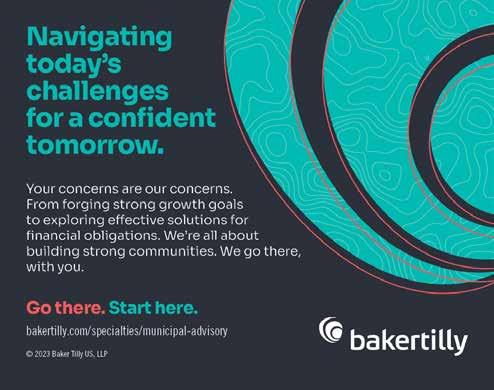
Disability Benefits

The trial court thereafter certified the lawsuit as a class action after an extensive hearing and the Missouri Supreme Court, on Nov. 24, 2015, denied Charter’s petition to prohibit the trial court from hearing the case as a class action.


Legislation was then introduced to amend Rule 52.08 (Class Actions) to add the following language: “No county, city, village town or other political subdivision of the state of Missouri shall participate in any action in Missouri state court under this rule as a representative or member of a class to enforce or collect any tax.” HB 2242.
MML Executive Director Richard Sheets and Municipal League of Metro St. Louis Executive Director Pat Kelly, working with numerous municipal lobbyists and officials, were able to persuade legislators to defeat the legislation by a House vote of 39 to 111 on April 14, 2016. The importance of their hard work cannot be overemphasized.
To reward your commitment to the continual process of learning new skills and abilities in the local government field, MML sponsors the Municipal Governance Institute. Participants who complete the program are designated as "Certified Municipal Officials" by the Missouri Municipal League. Participants complete 12 hours of study in core areas and four hours of elective training. The program is open to both elected and appointed municipal officials and utilizes existing MML training opportunities, such as conferences and online training, as well as specially-crafted workshops to provide meaningful and useful information.
• The program is open to both elected and appointed municipal officials.
• Electives allow officials to focus on leadership-based courses.

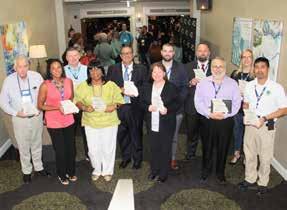
• Registration is accomplished with ease and speed.

• The program utilizes existing MML training such as conferences and online training, as well as custom-crafted workshops to provide meaningful and useful information.
MML members who have received designation as a "Certified Municipal Official" are now eligible for an advanced certification program, or AMGI. The advanced program offers increased challenges and rewards, requiring the completion of study in 14 core areas. Each custom-crafted module is tailored to assist Missouri local officials in their mission to better serve their communities.


What sparked your interest in serving in local government?
As a seventh generation Phelps Countian, growing up in Rolla, this community and the needs of our citizens have always been close to my heart.
I have previously served my community in several different capacities over the years and was inspired to become involved with local government because our community needs were not being met; our voices would go unheard. My goal was to bring a servant’s heart to local government and help bring the voice of the people to the forefront by having concerns addressed.
What has been the toughest lesson you have learned during your career in local government?
One of the toughest issues facing local government is having a true understanding of the inner workings of local government. It is very important elected officials have a real understanding of our responsibilities and become knowledgeable on council and mayoral duties. We have all seen what happens when career politicians are allowed to push agendas in an effort to maintain the status quo. Educating ourselves as elected officials on laws, regulations, guidelines, policies and procedures is how elected officials effectively represent the citizens of the community.
What advice would you offer to someone considering service as a local government official or employee in their community?
The best advice I could give is to be true to your community and listen to your constituents. Many times you hear politicians say words only to see actions paint a different picture. Serve with honor and make your community proud. I would also suggest actively participating in programs available through the Missouri Municipal League. The knowledge and resources I have obtained from the Missouri Municipal League’s MGI program and conferences have been extremely beneficial to my effectiveness as a council member. Municipalities are fortunate to have the opportunity to empower themselves through the MML resources.
How would you describe your city to someone who had never visited?
Rolla is a unique and family-friendly community located on historic Route 66 with great boutiques, amazing restaurants and theaters. We have beautiful parks that include walking and biking trails within our 300-plus-acre park system. Rolla provides easy access to a number of rivers and streams, forests, caves and springs all within a very short driving distance from our town that provide many opportunities for fishing, hiking, boating, kayaking and other outdoor activities.
Rolla is also home to the Missouri University of Science and Technology. Missouri S&T is ranked fifth in the nation for students interested in engineering and is ranked first in Missouri. It is also ranked the #1 public university in Missouri for return on investment. Missouri S&T’s Celebration of Nations is one of the largest international festivals in the Ozarks.
Rolla has lots of great local history. One historical site is the Frisco 1501 Engine. It was one of 30, 1500 series engines built in 1923 for Frisco Railroad. It is open year-round for tours by appointment and admission is free.
Above all, Rolla is one of the (in my very humble opinion) friendliest communities you could ever visit. Our community members are what truly makes Rolla thrive and flourish.
My husband and I have four children, and saying they keep us extremely busy is an understatement. We are always on the move with sports and activities. There is nothing more important and precious than family time. As a family, we are also very active with giving back to the youth in our community; helping to support, uplift and empower our future leaders of tomorrow.
Where would you most like to travel, and why?
Our family really enjoys the outdoors. I would love to take a trip to Ireland to see the stunning landscapes and coastlines.






Paul Campo, with Williams and Campo Law Firm, was honored with the Lou Czech Award at the Missouri Municipal Attorney Association (MMAA) annual meeting in Osage Beach, Mo., in July.
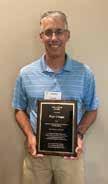

The award honors the memory of Lou Czech, who served as city attorney in Berkeley from 1954 to 1994 and Hazelwood from 1970 to 1994. Czech was a founder of the MMAA. The award recognizes public service by municipal attorneys who display the same high standard of accomplishment, professionalism and ethical conduct as exhibited by Czech. Campo was nominated and chosen by his peers in MMAA.
Campo is a founding shareholder of the Williams and Campo Law Firm. He currently serves as city attorney for the cities of Excelsior Springs, Riverside and Lone Jack, Missouri, and as the county counselor for Cass County, Missouri. He is also general counsel for multiple special districts in the state.
Prior to founding his law firm, Campo served as law clerk to the Honorable William Ray Price Jr., then Chief Justice of the Missouri Supreme Court. He later practiced with Stinson, Mag & Fizzell, P.C. He served as an adjunct professor at the University of MissouriKansas City (UMKC) School of Law teaching land use law in 2006 and 2007.
Wm. Randolph “Randy” Weber, with Hamilton Weber LLC, was honored by the Missouri Municipal Attorney’s Association (MMAA) with the inaugural Fred Boeckmann Longevity Award. This award is named in honor of Fred Boeckmann, the longstanding city attorney with the city of Columbia, Missouri. This award will be presented to MMAA members who have exhibited a remarkable tenure of service to a single community over the course of a career.
In his more than 40-year career, Mr. Weber has served as St. Charles County Counselor and as city attorney or special counsel to several municipalities. Mr. Weber served as special

Offices located in St. Louis · Jefferson City · Springfield
Our “Request for Proposal – Notice to Bidders” distribution network sends your road work, building, utility and infrastructure project details directly to 90+ member contractors and dozens more interested trade contractors via email. Visit www.agcmo.org/RFP to learn how to use this service.

counsel/city attorney for the city of St. Peters since 1998. During his tenure as city attorney for the city of St. Peters, he successfully negotiated numerous public and private partnerships resulting in over a billion dollars of investment in the City. This includes the successful development of the Lakeside 370 Development, which is comprised of an 850-acre business community and a nearby 500-acre park. As part of this development, he negotiated the largest land purchase in the history of St. Charles County and the construction and financing of a 500-year levee in the face of multiple lawsuits challenging every aspect of the development.
Melissa Mattson, deputy clerk and collector, city of Albany, Missouri, and Tara Berreth, city clerk with Osage Beach, Missouri, have earned the Master Municipal Clerk (MMC) designation from the International Institute of Municipal Clerks (IIMC). The Master Municipal Clerk (MMC) is one of the two professional designations granted by IIMC. To qualify for the MMC Designation, one must first earn the Certified Municipal Clerk Designation (CMC) and commit to life-long learning by attending extensive advanced education programs and making significant professional contributions to the community and municipality they serve. Those that achieve the MMC Designation have demonstrated that they have actively pursued educational and professional activities and have remained informed of current socio-political, cultural, and economic issues that affect local governments and municipalities.
Building

Congratulations to Melissa McChesney, city clerk with the city of Parkville, for earning the prestigious Certified Municipal Clerk (CMC) designation! The Certified Municipal
Clerk (CMC) is one of the two professional designations granted by the International Institute of Municipal Clerks (IIMC) and is designed to enhance the job performance of the clerk in small and large municipalities.To earn the CMC designation, a municipal clerk must attend extensive education programs, often totaling more than 120 educational hours. The CMC designation also requires pertinent experience in a municipality.
Missouri American Water Burns & McDonnell
NLC Service Line Warranty Program by HomeServe
Stifel
Lauber Municipal Law, LLC
Curtis, Heinz, Garrett & O'Keefe, P.C.
Forward Slash Technology
Cochran
Hamilton Weber, LLC
Baker Tilly
Missouri LAGERS
Ollis/Akers/Arney Insurance & Business Advisors
PFM Asset Management, LLC
Liberty Utilities
HDR Lamp Rynearson
AT&T-Missouri
SILVER SPONSORS
Piper Sandler & Co.
MIRMA
Gilmore & Bell, P.C.
MoDNR Brownfields/Voluntary
Cleanup Program
General Code
Trane U.S. Inc.
JTS Financial
Veregy
Missouri Rural Services Corp. & Missouri Rural Services Workers' Compensation Trust
Opinion Research Specialists, LLC
Schneider Electric
Raymond James & Associates, Inc.
Missouri One Call System












